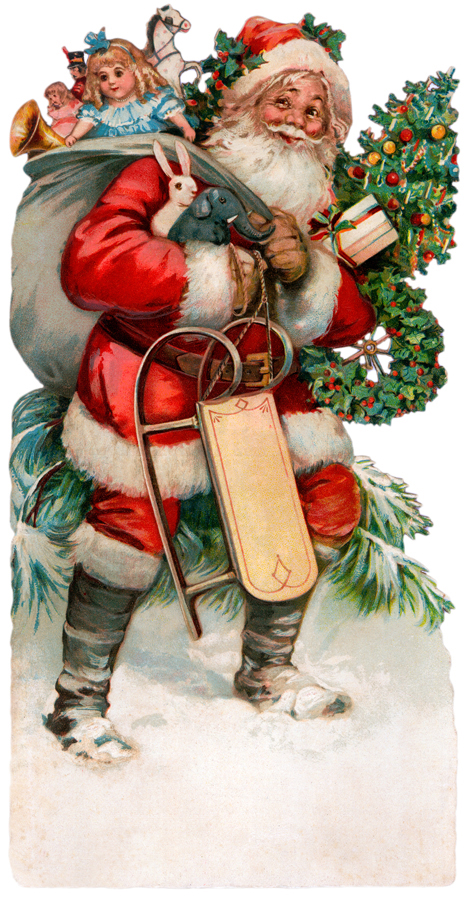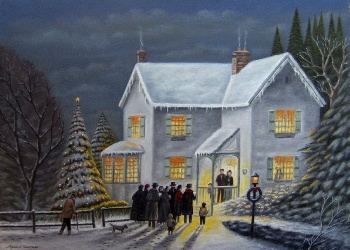Because the emigrants in my first Oregon Trail novel traveled between April and October, I didn’t have to write about their Christmas celebrations in that book. But the sequel covers a three-year time span, so as I work on this draft, I am learning about Christmas traditions in the late 1840s.
The American Puritans abhorred the often drunken celebrations that characterized Christmas in Europe prior to the Reformation. In colonial days, Massachusetts made celebrating Christmas illegal. It wasn’t until the early 19th century that Christmas again became a significant holiday, and new customs and traditions developed, both in Europe and in America.
 In the United States, the author Washington Irving created the legend of Santa Claus in the early 1800s. Irving took several legends about the Dutch St. Nicholas and created our American Santa Claus. In 1809, he published the History of New York, in which he described fictitious celebrations of St. Nicholas. The book became popular from drawing rooms of New York City to log cabins on the frontier.
In the United States, the author Washington Irving created the legend of Santa Claus in the early 1800s. Irving took several legends about the Dutch St. Nicholas and created our American Santa Claus. In 1809, he published the History of New York, in which he described fictitious celebrations of St. Nicholas. The book became popular from drawing rooms of New York City to log cabins on the frontier.
In 1822 Clement Clarke Moore wrote a poem to amuse his children called “A Visit from St. Nicholas,” which we all know from its famous first line “‘Twas the night before Christmas . . . .” The American custom of Santa Claus visiting all the good little boys and girls on Christmas Eve grew from this poem, and now parents everywhere bear the brunt.
Charles Dickens published A Christmas Carol in 1843. Its depiction of a Victorian Christmas is reasonably close to the era of my novels. However, not all English customs crossed the Atlantic, and even those that made it to the Atlantic cities of the United States did not necessarily travel to the western frontiers.
 Though the tradition of caroling is old, many of the Christmas carols we sing today did not exist in the late 1840s. Those that were sung in this time period (with their year of origin) included Angels from the Realms of Glory (1816), Bring a Torch, Jeanette, Isabelle or Un Flambeau, Jeannette, Isabelle (1553), Deck the Halls (1500s), The First Noel (1600, possibly earlier), God Rest Ye Merry Gentlemen (1833), Good Christian Men Rejoice (1837), The Holly and the Ivy (1600, possibly earlier), Joy to the World (1839), O Christmas Tree (1824), O Come All Ye Faithful or Adeste Fideles (1200s), O Come, O Come Emmanuel (1100s), Sing We Now of Christmas or Noël Nouvelet (1400s), Twelve Days of Christmas (1780), We Wish You a Merry Christmas (1500s), and While Shepherds Watched Their Flocks (1700).
Though the tradition of caroling is old, many of the Christmas carols we sing today did not exist in the late 1840s. Those that were sung in this time period (with their year of origin) included Angels from the Realms of Glory (1816), Bring a Torch, Jeanette, Isabelle or Un Flambeau, Jeannette, Isabelle (1553), Deck the Halls (1500s), The First Noel (1600, possibly earlier), God Rest Ye Merry Gentlemen (1833), Good Christian Men Rejoice (1837), The Holly and the Ivy (1600, possibly earlier), Joy to the World (1839), O Christmas Tree (1824), O Come All Ye Faithful or Adeste Fideles (1200s), O Come, O Come Emmanuel (1100s), Sing We Now of Christmas or Noël Nouvelet (1400s), Twelve Days of Christmas (1780), We Wish You a Merry Christmas (1500s), and While Shepherds Watched Their Flocks (1700).
But imagine caroling without Angels We Have Heard on High (1862), Good King Wenceslas (1853), Hark! The Herald Angels Sing (1855), Jingle Bells (1857), Silent Night (1859), We Three Kings (1863), and What Child Is This? (1865).
The songs we sing today came from many European traditions. English, French, and German hymns and carols have all found their way into the American Christmas, but not in all locations at the same time. Many of the oldest hymns are Catholic, but lost favor during the Reformation.
The American pioneers had different ways of celebrating Christmas (as all other holidays), depending on their national origin and religion. In my novel, some of the characters are of English heritage, and some are French. Some came from Boston, some from the Midwestern plains, and some from the South. Most are Protestant, but some are Catholic. Some were educated, some could not read.
As a writer of historical fiction, I have to consider all these elements as I develop the Christmas scenes in my book – the songs they sung, the churches they went to (if churches had yet been built in those locales), the meals they ate, the presents they gave. All of these customs depended on the characters’ backgrounds and on what was available on the frontier.
Think about your own family’s traditions. Which have lasted many generations, and which have you begun recently? Which will survive till the next century’s turn?




Great informative post! It’s hard to see the traditions end, but I see many ending.
i give tradition a lot of thought and wrote an article titled “Traditions” last year for the KCWG Christmas Collection. It seems tradion is forever changing and it is interesting to watch the children and grandchildren begin their own. It is also heart-warming to see the trickle down effect of those started years ago.
I really enjoyed reading the exact origins of traditional stories and carols, Theresa.The information you have shared will be fun to pass on at our traditional Christmas Eve celebration. Thank you
As a child, we all went together to Christmas Eve service, then came home to sing Christmas carols until midnight. The whole family came to our house for the holiday becuase we owned a motel. No getting away, but lots of room to sleep. Now our children go to their own churches and come to our place for Christmas day. Great-grandmother’s birthday fell on Christmas and until recent years, we honored her memory with a white cake with fresh coconut icing; her favorite. Sorry, great-grandmother. No one cares for coconut cake. Gone also is Aunt Camille’s red hot applesauce jello salad. No one likes jello anymore. Now if I could only find my mother-in-law’s pecan log roll recipie, it would delight everyone. But alas, I fear it went with her when she died.
Theresa,
Thank you for the enlightening post. I love Dickens’ A Christmas Carol. I’ve read where it was intended as social commentary about England’s poor. When I was very young, too young to remember when, my grandmother gave me a copy of the story. The cover was a deep-red velvet with gold stamped letters. The pages were glossy and beautiful prints were included with the text.
I need to finishing unpacking and find that book.
Smiles,
Linda Joyce
Silly pilgrims, not wanting to revel! I grew up in a non-drinking home but thankfully married a Catholic. That changes everything! And now we revel. Hope your Christmas is full of carols, revels, and some good punch for a snippet of decadance.
PS: my personal tradition, for many years, is to read A Child’s Christmas in Wales, Dylan Thomas, to anyone who will listen and in some years only myself. But then, there you are….a Welch poet fond of drink.
Lots of good traditions out there! I’ve inherited mine, more than made my own — my daughter insists on Christmas at grandparents.
Theresa